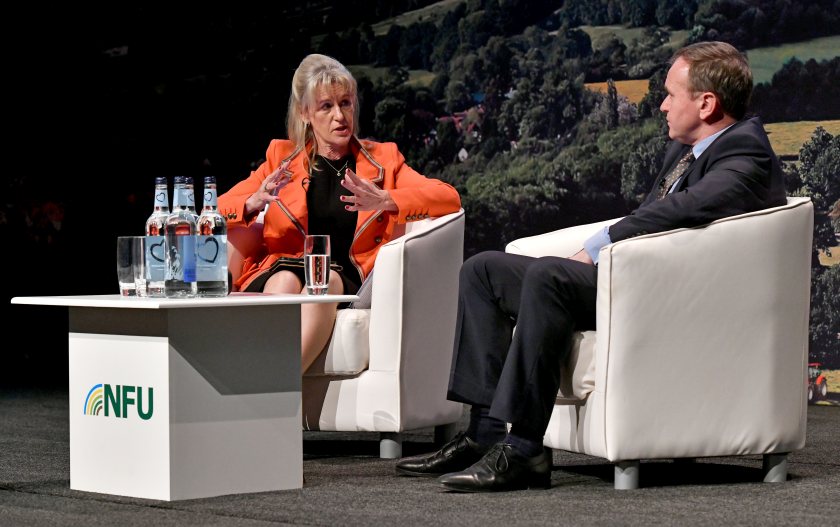
George Eustice faced a series of tough questions at the NFU Conference on the future of UK farming, including Farming Rules For Water, the Sustainable Farming Incentive, the Australia trade deal and the pig sector's crisis.
Mr Eustice spoke with NFU President Minette Batters and took questions from the union's members on a series of issues affecting the industry.
The Defra Secretary told the conference that the national living wage for those on the Seasonal Agricultural Workers Scheme (SAWS) would remain at £10.10.
It came as Mrs Batters challenged him on the Home Office missive sent to labour providers days prior.
Mrs Batters said: “I find it unforgiveable that you are assuring this audience that we are going to be sticking with the £10.10 and yet that missive went out to the labour providers.
"Imagine what that has done to these growers, who have faced such uncertainty. How do we collectively resolve this?”
Mr Eustice responded: “It is regrettable when mistakes happen in guidance. The policy we’ve got is clear; there is going to be a minimum wage that will be higher than the national living wage for those coming in under the Seasonal Agricultural Workers Scheme.
"It will be £10.10 an hour, and we will ensure any clarification needed is given.”
Within his address, Mr Eustice announced an expansion to the Farming Equipment and Technology Fund which was hugely oversubscribed on its launch in late 2021.
He said the fund would increase to £48 million, allowing more than 4,000 more farmers to proceed with their applications.
He said: “I recognise the phenomenal efforts of the food and farming industry in helping us deal with the pandemic, particularly early on when we had that panic-buying episode.
"I want to thank Minette and the NFU team in working with Defra develop future policy.”
Mr Eustice also implied that government wants to focus on the individual needs of each farmer, and he heavily promoted Defra’s Animal Health and Welfare Pathway.
After considering industry positives in recent times, such as rising beef and lamb prices alongside combinable crop market recovery, he acknowledged that some of these changes to farm income could be temporary as these things move in cycles.
He spoke of the sharp price rises in inputs biting profit margins, and of the difficulties within the pig sector and how Defra has a long term goal of creating a more transparent food chain.
He said: “At the heart of future agricultural policy is the wish to support individual farmers and their choices” and continued to say Defra wanted to see the end of the ‘top down’ rulebook from the EU and for people to choose what’s right for their farms.
Speaking about future policy implementation, he said: “We are encouraging those farmers not already in Countryside Stewardship to engage with that programme.
"It gives them opportunity to engage with the schemes more ambitiously than the SFI might enable them to.
"We envisage that Countryside Stewardship may become a stepping stone to local nature recovery (LNR) and it will be very easy for farmers to convert Countryside Stewardship agreements in future to a future LNR scheme.
"Already, we have 40,000 engaged in Countryside Stewardship – I would encourage those of you not engaged to get involved," Mr Eustice said.
“In Defra, we are committed to designing our future policy with industry, we’ve put in place this policy of co-design with groups of technical experts in each area working with us to design the future policies as we put them in place.”
